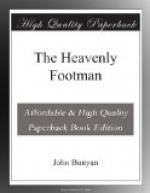Consider thus, 1. Thy soul, is thy own soul, that is either to be saved or lost. Thou shalt not lose my soul by thy laziness; it is thy own soul, thy own ease, thy own peace, thy own advantage or disadvantage. If it were my own that thou art desired to be good unto, methinks reason should move thee somewhat to pity it. But alas! it is thy own; thy own soul! “What shall it profit a man if he shall gain the whole world, and lose his own soul?” God’s people wish well to the soul of others, and wilt not thou wish well to thy own? And if this will not provoke thee, then,
Think again, 2. If thou lose thy soul, it is thou also that must bear the blame. It made Cain stark mad to consider that he had not looked to his brother Abel’s soul. How much more will it perplex thee, to think, that thou hadst not a care of thy own? And if this will not provoke thee to bestir thyself,
Think again, 3. That if thou wilt not run, the people of God are resolved to deal with thee even as Lot dealt with his wife; that is, leave thee behind them. It may be thou hast a father, mother, brother, &c, going post haste to heaven. Wouldst thou be willing to be left behind them? Surely no.
Again, 4. Will it not be a dishonor to thee to see the very boys and girls in the country, to have more wit than thyself? It may be the servants of some men, as the horsekeeper, ploughman, scullion, &c, are more looking after heaven than their masters. I am apt to think sometimes, that more servants than masters, that more tenants than landlords, will inherit the kingdom of heaven. But is not this a shame for them that are such? I am persuaded you scorn that your servants should say that they are wiser than you in the things of the world; and yet I am bold to say, that many of them are wiser than you in the things of the world to come, which are of greater concernment.




